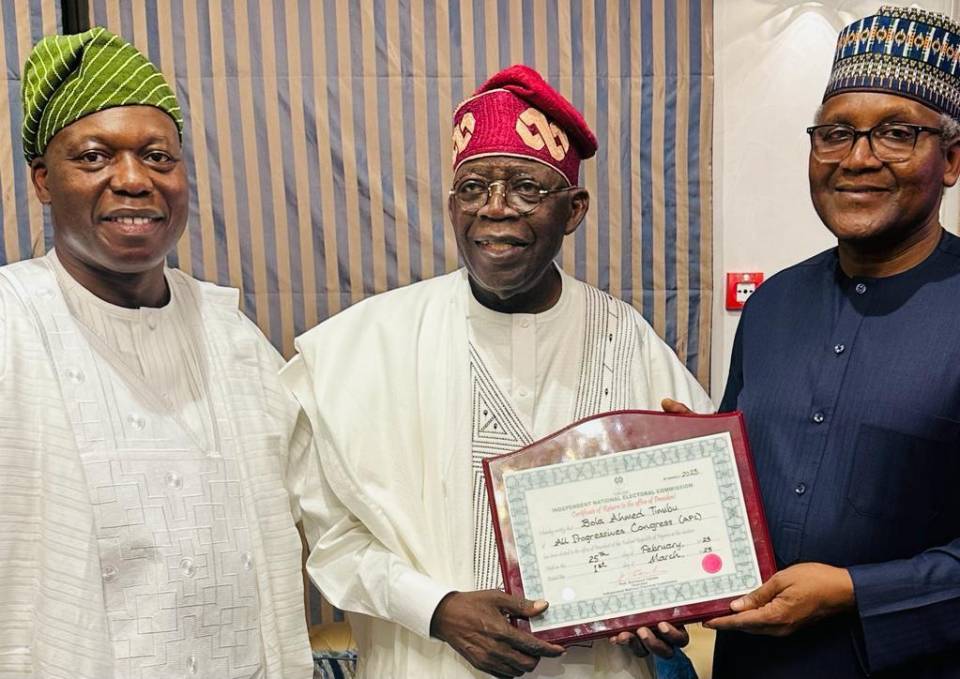Bola Ahmed Tinubu promised to "renew hope" for Nigeria - 5 ways he can achieve this by Al Chukwuma Okoli
His closest rivals were Atiku Abubakar of the People’s Democratic Party and the Labour Party’s Peter Obi. Abubakar got 29% of the votes cast while got Obi got 25%.
Atiku’s and Obi’s parties described the poll as a sham and demanded a cancellation. They may end up in court to challenge Tinubu’s victory.
The parties protested against the inability of the Independent National Electoral Commission to upload the presidential election results from each of the 176,606 polling units on an electronic portal accessible to all citizens, as early promised.
For its part, the electoral commission blamed its failure to upload the results on poor internet connectivity. The explanation did little to assuage the protesting parties especially as the electoral commission conducted a voting exercise ahead of the election in a bit to anticipate internet network failures.
The controversies surrounding Tinubu’s victory underscore the task ahead of him. Once he’s inaugurated, he will have to lead his administration in five key focus areas.
He must restore the waning public faith in government by building legitimacy. Secondly, he must demonstrate the new administration has the capacity to govern effectively. Thirdly, his government should be concerned with protecting people from all forms of vulnerabilities, including political, social and economic.
Fourthly, he must mitigate the material drivers of corruption and criminality by reducing poverty, unemployment, underemployment and inequality. And finally, government institutions must undertake to serve the interests of ordinary Nigerians.
Tinubu was a two-term governor of Lagos State and a former Senator of Federal Republic of Nigeria. Considered by fans and followers as an astute and pragmatic strategist, who has the sagacity to excel in party politics, he promised Nigerians a new deal of progressive leadership through his mantra of “renewed hope”.
However, many Nigerians doubt that Tinubu can rescue a system in which he has been a prime actor – as well as a benefactor.
Nigeria today
In the twilight of the arguably unpopular administration of President Muhammadu Buhari, the travails of the nation do not seem to be abating.
In the weeks before the election, the country faced the multiple crises of fuel scarcity, a massive spike in the cost of living and a cash scarcity.
Nigeria was also already experiencing extensive national security threats. These affect almost all of the country in different ways.
There is a banditry crisis in the north-west and north-central regions. Separatist violence and associated criminal opportunism affect the south-east.
Some parts of the south are controlled by gangs and ritual brigands whilst others are affected by piracy and oil theft. In the wider northern Nigeria jihadist terrorism is rampant.
The state of the nation in the past seven and a half years of Buhari’s administration has been precarious. His government appeared to be unable to protect the country from its multiple governance and development woes.
It is doubtful that Tinubu represents the popular change that the country needs. Or that his tenure offers a progressive departure from the status quo that many Nigerians were angling for. This is because he is very much part of the country’s political establishment.
Popular expectations and priorities
The task before the incoming government is to fulfil people’s expectations by responding to their legitimate yearnings and aspirations. And this is beyond electioneering.
The administration must get its priorities right. Oftentimes in Nigeria, governments come to power without any clear understanding of what it takes to govern, and what specific concerns of governance to pursue. I suggest these as the way forward:
-
The incoming administration must strive to restore the waning public faith in government through altruistic leadership. The welfare of the people must come first in its policies and actions.
-
The administration must build legitimacy and capacity to govern effectively. Beyond having the requisite mechanisms, institutions and policies, people’s goodwill and confidence must be sought and sustained through responsive and responsible statesmanship.
-
Human security and sustainable development should be the focus. Government should be concerned with protecting people from all forms of vulnerabilities, be they political, social, economic, ecological or cultural. National development should be planned and carried out in a way that looks after the country’s interests in the present and the future.
-
The material drivers of corruption and criminality should be mitigated by reducing poverty, unemployment, underemployment and inequality. Social investment programmes that targets the poor and unemployed should be pursued. The wage structure and package of the government and corporate workers should be enhanced in the light of economic realities.
-
Government institutions should perform better to deliver the common good by undertaking to serve the interest of the populace in their policies and programmes.
What next?
The 2023 elections and transition offers Nigeria an opportunity to reposition itself for good governance, sustainable security and development.
The expectation is that the incoming President will mark a shift from the legacies of Buhari’s administration, by bringing his personal leadership style to bear on the process of governance. The crux of this endeavour should be to secure and develop the society in pursuit of the welfare of the people.
As Nigerians hopefully count down to the 29 May handover to the new administration, it is expected that the incoming government will live up to its promise of renewed hope, and deliver a popular regime of good governance.
Al Chukwuma Okoli has consulted for UN-Women, Centre for Democracy and Development, as well as Open University of Nigeria. He is a tripe Laureate of CODESRIA and a member of CORN-Wet Africa.





